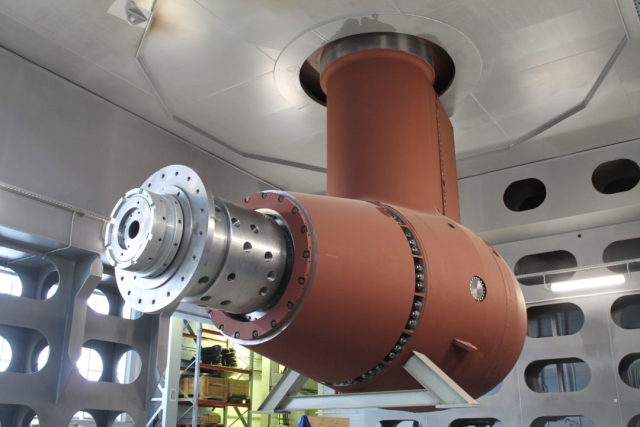The Media Club news agency, under the heading "Sanctions require complex solutions - opinion," published an interesting interview with the Deputy General Director of the Zvezdochka Ship Repair Center JSC - Director of the Center for Propulsion Systems (CPS)Alexandra Sivkova on the problems with the production of propulsion and steering columns (DRC) and thrusters in Russia and import substitution in this area of marine equipment.

Ship propulsion and steering column manufactured by the Center of propulsion Systems (CPS) JSC "Ship Repair Center "Zvezdochka" (c) JSC "Ship Repair Center "Zvezdochka"
The onslaught of sanctions from abroad has not only not stopped in recent years, but has significantly intensified since February of this year.
The topics of import substitution and ship repair were key at the forum "Shipbuilding in the Arctic", which was recently held in Arkhangelsk, in which the delegation of the Asterisk CA also took part. How the restrictive measures affected the "civil" direction of the "Asterisk" - the work of the center for propulsive systems - the Deputy Director General - Director of the CPS told the Media ClubAlexander Sivkov after the completion of the forum.
As the director of the CPS notes, thanks to this event and, first of all, to its organizers - the association of suppliers of the oil and gas industry "Constellation", the shipbuilding cluster of the Arkhangelsk region, it became possible to bring together all interested parties, including suppliers of ship equipment.
On the first day of the forum dedicated to import substitution, we held talks with Boris Anatolyevich Kabakov (Ministry of Industry and Trade), Vasily Igorevich Strugov (Rosmorport), Governor of the Arkhangelsk Region Alexander Vitalievich Tsybulsky, Sergey Vladimirovich Smirnov (Shipbuilding Cluster of the Arkhangelsk Region). We discussed two important topics. The first is to provide ships under construction, primarily icebreaker class, with domestic propulsion.
The center of propulsive systems "Asterisks" is today the only production in Russia ready to provide design, manufacture and maintenance of propulsion and steering columns (DRC) with a capacity of up to 9 MW with an ice class up to Icebreaker7, as well as thrusters and propellers. The demand in the DRC for 9 MW with Icebreaker7 ice class today is with Rosmorport, in whose interests an icebreaker of the 21900M2 project is being built at the Vyborg Shipyard, and with the Maritime Rescue Service, by order of which an IBSV02 project vessel is being built at the Turkish shipyard STFINE SHIPYARD. The governor supported Zvezdochki's CPS as a supplier of similar DRC, drew attention to the uniqueness of the production, which he personally visited, and expressed confidence in us as a manufacturer," Alexander Sivkov comments.
The policy of the past years, when ship equipment was bought from foreign partners without regard to the consequences, played a cruel joke with Russian shipyards, ship customers, and their owners today. According to Alexander Sivkov, in the components of the equipment created in the Russian Federation, there are products that cannot be replaced with domestic analogues, since they simply do not exist in modern Russia or their production has been lost. This was the second topic of the dialogue. For CPS, these are bevel gears for DRC gearboxes (previously, gears were purchased in Finland).
The Center for Propulsion Systems has been engaged in the production of DRC and thrusters for the civil shipbuilding sector for several years. With the support of the Ministry of Industry and Trade, the Zvezdochki CPS first carried out the design and manufacture of 3 DRC prototypes of various capacities from 2.5 to 9 MW and various ice classes from Arc4 to Icebreaker7. Based on the results of the work and the experience gained, he completed the serial delivery of ten propulsion and steering columns according to projects of his own development. Four of them are in operation on 2 tugs of project 23470 "Andrey Stepanov" and "Sergey Balk", each of the columns has a capacity of 2.7 MW, ice class Ags4; the other 4 columns have a capacity of 4.5 MW and are supplied for cable laying of project 15310 "Volga" and "Vyatka", ice class Ags4. Two more 2.4 MW ice-class Ags5 columns have been delivered to the 20181 Akademik Makeev vessel under construction at Zvezdochka. In 2021, a contract was signed and the company started manufacturing two DRCs of the AT32B1 project with a capacity of 3 MW of ice3 ice class, and this year a contract was signed for the manufacture of two DRCs of the AT40B1 project with a capacity of 4.5 MW with an Arc4 ice class. In all projects of the DRC, bevel gears (KZP) of foreign production ("Ata Gears") were provided. Sanctions restrictions have become a serious obstacle to the manufacture of these DRCs within the terms specified in the contract. The impossibility of importing bevel gears from Finland and the lack of production in Russia for their manufacture (the maximum diameter of gears, including promising projects, reaches 2.5 meters) required a change in projects, equipment suppliers and logistics chains.
To understand the depth of the problem associated with our use of foreign bevel gears in the project, it is necessary to delve into the history of the issue. There are only two systems worldwide for cutting curved (circular) teeth of conical wheels suitable for completing the DRC. Each system determines its own tooth geometry, wheel dimensions and technology of its creation from the workpiece to grinding. In the Soviet Union, the Gleason system was adopted with periodic division when cutting teeth that decrease in height, which subsequently need to be ground with a conical surface of a circle similar in shape to the incisors of a tooth-cutting head. The products were produced with a maximum diameter of 800 mm. And the Orlikon-Klingelnberg system with a continuous division of the process of cutting equally high teeth (cyclopalloid engagement), which is no longer possible to grind around due to the surface features of the teeth. After heat treatment, the resulting cyclopalloid engagement can only be cleaned with a special tool with a cutting part made of a special fine-grained metal-ceramic material, the brand of which and the production technology are kept secret by the company.
The transition of the "Asterisk" CPP to order components from China is accompanied by significant risks and is a temporary forced measure, and we are taking steps to find and develop the production of domestic CPP.
We discussed the topic of the early launch of the production of such KZPS in Russia with the diameter we need up to 2.5 meters with Boris Anatolyevich Kabakov (Ministry of Industry and Trade). There is a possibility of creating a separate or developing on the basis of existing production sites with Russian processing and measuring centers. And, for example, the Saratov Heavy Gear Cutting Machine Plant has experience and the necessary competencies in this matter. Of the 24 machines produced by this plant, 12 were purchased in the 90s and exported to China, where they were modernized using CNC. Subsequently, similar Chinese machines were designed and manufactured on their basis.
For me, the question of the need to gain real independence in the issue of the production of KZP in Russia is obvious, as it is directly related to the independence from sanctions in the creation of our DRC, and as a result, the possibility of building ships equipped with them. When the topic of new production is raised, the question arises about its payback. If we consider the payback to be made by the CPP, then such production will pay off in decades, so its creation is possible only with state support," explained the director of the CPS.
The second day of the forum was devoted to another hot topic - ship repair. The heads of ship repair plants drew attention to the need to build docks to meet the increased demand of shipowners for dock inspection and repair of ships in Russia and in Arkhangelsk in particular. The forced refusal of shipowners from the services of foreign shipyards due to sanctions not only gives additional work, but also poses very difficult tasks for the repair of imported equipment that ships are equipped with, since the working design documentation necessary for repair is often missing, and timely provision of original spare parts is impossible, as well as the participation of Western service engineers.
Alexander Sivkov believes that the current situation, which they discussed at the forum, will encourage not only the adoption of complex decisions on paper on the transition to maximum independence of machine tool construction, mechanical engineering and shipbuilding from now former foreign partners, but also to their real implementation in production.

Deputy General Director of JSC "Ship Repair Center "Zvezdochka" - Director of the Center for Propulsion Systems (CPS) Alexander Sivkov (c) press service of JSC "Ship Repair Center "Zvezdochka"
